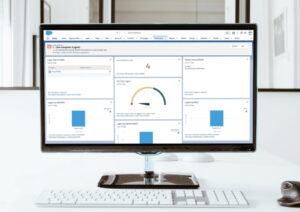The effective selection, use, and integration of customer relationship management (CRM) tools are the secret sauce for gaining increased sales and happier customers. In this article, we’ll define what CRM is, explore the value of CRM tools and, more specifically, consider why effective CRM integration is essential for every modern digital business.
So, let’s get started!
What Is CRM?
CRM is a software platform designed to enhance and optimize the relationships a business has with its customers. A CRM system allows you to schedule, coordinate, track, and measure customer outreach efforts across multiple channels and touchpoints. It also enables different teams to work together – rather than at cross-purposes – when engaging with customers. These teams typically include people from sales, marketing, customer success, customer service, and even event management.
It’s clear just how vital CRM is to identifying, nurturing, and converting prospects and leads into customers. According to Grand View Research, approximately 90% of organizations that have over 10 employees are currently using a CRM.
For a deep dive into the definition of CRM, read our full guide.
What Is CRM Integration?
Integration is vital in ensuring that a business extracts maximum value from its investment in CRM platforms and tools. Essentially, CRM integration involves connecting the CRM platform with other related or unrelated business systems.
Effective CRM integration ensures that there’s a “single source of the truth” when it comes to customer data. It also ensures that data is accurate, complete, and fully up to date. With the best CRM platforms, this aggregated data is available to all internal stakeholders 24/7 from their mobile devices.
When disparate systems are correctly integrated into the central CRM hub, it allows management to gain a 360-degree view of the entire customer lifecycle – anything from who last met or spoke with a high-value customer to who is following up on a customer complaint and the progress of that outreach and incident resolution.
So, what are these “other” systems that can and should be integrated into your enterprise CRM platform?
The most common instances include:
Marketing Automation Software
Modern marketers understand the criticality of integrating their marketing automation tools with their CRM platform. That’s because it gives them a clear line of sight into all-important customer data and the ability to access it in a central repository.
These insights allow marketing teams to plan, execute, follow up on, measure, and report on highly targeted marketing campaigns.
If you integrate your email and CRM platforms, you give your users the ability to insert customer records directly from the CRM system into their email templates and newsletters. CRM email integration also gives marketers a means to quickly create targeted email campaigns for specific customer groups or segments – drawing on the most up-to-date data stored in the CRM system.
Once email outreach has been initiated, senders can easily determine how well these efforts resonate with the recipients. They can see exactly who is opening and clicking on emails. Success or otherwise on this front can be used as input into future campaigns, thereby creating a cycle of continuous and iterative learning.
Calendars
When a CRM platform is integrated with the enterprise calendar exchange, it’s possible to gain insight into the volume, type, and frequency of all virtual and personal meetings between people in your organization and different customers. This helps identify “who knows who” best within key accounts. It can also highlight “warm” relationships that exist but might not be immediately apparent.
Additionally, it allows for more informed planning and better decision-making about customer events.
Internal Team Communications
Today’s more advanced CRM tools allow for integration with your enterprise communication and collaboration platform(s). Essentially, your teams can collaborate within the CRM platform itself. Many tools allow for automatic email alerts and reminders to be sent to team members and for individuals to assign others specific tasks or actions.
This goes a long way in cutting down the level of manual communication among individuals and teams, as all notifications can be sent and received through a single source.
Social Media
Integrating CRM with social media platforms gives you the means to communicate with your customers in a timely and relevant manner to forge deeper, more meaningful relationships. It also allows you to react quickly to customer or industry news and events.
CRM integration with social media channels enables you to publish social posts to your various accounts simultaneously and without having to use other tools.
It’s also a great way to gauge how your customers are interacting with your social posts and web pages.
Other enterprise software and tools that are commonly integrated with CRM platforms include inventory management, financial and accounting systems, and HR systems.
Why Is CRM Integration Important?
CRM integration is important in the modern business context for several reasons, most notably:
- It lets you automate repetitive tasks like updating data, drawing up reports, and sending emails. Ultimately, this helps you save time and money by hiring fewer dedicated in-house resources to direct workflow and keep manual records.
- Your organization will be in a stronger position to offer a high-quality customer experience when your enterprise systems are integrated because you’ll be able to spot issues or bottlenecks before they happen. Additionally, thanks to the granular insights you have about your customers’ behavior, you can hyper-personalize your outreach and avoid any duplication of effort across different teams.
- Sales management can immediately see how many leads, deals, and opportunities each salesperson has, so they can track performance and allocate internal resources efficiently.
- Data is updated in real-time, so you always have access to the most accurate and up-to-date information rather than having to search for it or ask others to share it with you.
- Most CRM solutions are cloud-based and mobile-enabled, which means you can access information from anywhere using your smartphone.
- Thanks to user roles and permissions functionality, you can set parameters about who in your organization has access to which data and records, depending on their role. This can ensure the confidentiality of sensitive customer data.
- When people have access to the same data, it reduces their workload and supports better teamwork, cooperation, and transparency within the business.
How You Can Integrate CRM
Regardless of the size of your business and your choice of CRM tools, effective CRM integration is vital.
If you have an in-house IT team, you might want to task them with planning and executing the integration. Bear in mind that there are risks associated with doing it alone: should the integration effort run into snags, you could end up with offline systems and inaccessible data, potentially damaging customer and user experiences.
More and more organizations are finding value in engaging a CRM integration consulting partner to handle their CRM integration project.
As a seasoned expert in CRM consulting, WayPath has helped hundreds of businesses across multiple industries to put their CRM strategies on the fast track to success.
We understand that when it’s correctly implemented, CRM integration can act as the glue that binds together all your business units so you can operate as one integrated enterprise in the eyes of your customers.
Make sure you do it right. Make sure you do it with WayPath.
We’d welcome the opportunity to discuss how we can help you streamline and accelerate your CRM integration efforts.
Please get in touch to speak to one of our team members.






